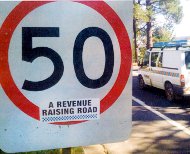10/15/2012
Former Australian Road Safety Official Questions Speed EmphasisRoad safety conference presentation in Australia urged officials to end the obsession with speed enforcement.

Road safety officials had their priorities challenged as they gathered at the Australian Institute of Traffic Planning and Management annual conference Thursday. Lex Stewart, the man responsible for road safety in the western region of New South Wales in the 1990s, presented data that suggests the industry's current obsession with speed enforcement is making roads less safe than they would otherwise be. In the past nine years, the fatality rate in NSW has stopped its long-term trend of decline and has leveled off. Over the same period, however, revenue generated from speeding tickets has increased 225 percent from $116 million to $263 million per year.
"In the 1960s we were far too lax and many drivers regarded it as a fundamental right to drive while very drunk," Stewart said. "However, in recent years has the pendulum swung too far the other way with ever-increasing 'big stick' punishments? Criminology tells us that the certainty of getting caught is a bigger deterrent than the hugeness of the punishment. Politicians choose to ignore that before elections and promise voters ever bigger punishments for all sorts of things, not only regarding road behavior. Of course, there is a role for penalties."
Stewart points out the data used to justify crackdowns on speeding are unreliable. Nearly 40 percent of incidents are labeled as "speed-related," even when the vehicle was traveling under the posted limit but in excess of what is reasonable for the given conditions. Stewart argued the typical accident report form encourages investigating police officers to designate the incident as "speed related."
"The police officer after valiantly directing traffic, working with ambulance officers to extricate bodies etc, then finally gets around to filling in the P4 Form," Stewart said. "Maybe a witness said the vehicles were in excess of the speed limit, but can they reliably tell the difference between a vehicle at 115km/h and one at 95km/h (under the 100 limit)? ...He or she looks at the mangled vehicles, the broken glass on the road, the skid marks etc, and wearily ticks the box 'Yes' to speeding. Thus, fundamental data on speeding is not accurate at its source, and I mean no criticism of police in saying that."
Stewart argued the effect of the enforcement mentality has been to force drivers to spend more time looking at their speedometer than looking at the road. Thanks to speed cameras, good drivers with long, accident-free histories often find themselves in danger of losing their drivers' licenses. Stewart argued the point system should be entirely replaced with a system where drivers start with 100 "merit points" and points are taken away based on scientific evidence of how dangerous the activity is, as measured by road trauma figures.
"Police be encouraged to have more frequent interactions with motorists to give cautions which have no dollar penalty but cost the motorist only one point," Stewart wrote. "Police can have more of an educational/warning role, and less (not zero) of a purely punitive role."
Stewart would also replace nearly all speed cameras with police officers.


